Green-School Officers run workshops for schools throughout Ireland on the topic of sustainable energy and climate change. We are offering a programme of workshops for primary and post primary pupils and teachers. Workshops are available as Gaeilge in regions with our Irish speaking facilitators.
Teachers can also avail of SEAI’s teaching resources, hard copy and online at Schools | Community Energy | SEAI
These workshops are directly linked to the curricula and are great way to inform and involve pupils and teachers in ways to save energy, take climate action and will help schools to achieve the Green Flag award. Workshops are delivered free of charge and involve inquiry-based learning through experiments, videos, games and talks. Schools can choose from the following:


Primary School Workshops | Post Primary Workshops |
| Junior: senior infants to 2nd classes | Junior Cycle |
| Senior: 3rd to 6th classes | Transition Year |
| Workshops for Teachers on Sustainable Energy | Workshops for Teachers on Sustainable Energy |
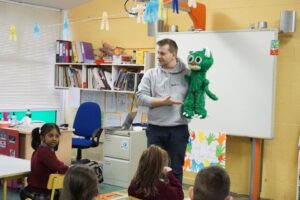
‘Guzzler’ the puppet can help the children learn about energy awareness. This workshop is approximately 40 minutes long and is aimed at senior infants and 1st class although it may also suit junior infants and 2nd class. We can run up to three workshops during the school day.
The children are introduced to Guzzler the puppet who loves to waste energy. Through a series of games and activities they learn about where our energy comes from, the importance of saving energy and the various ways in which they can save energy.
The workshop covers several strands of the science curriculum such as living things, energy and forces and environmental awareness and care.
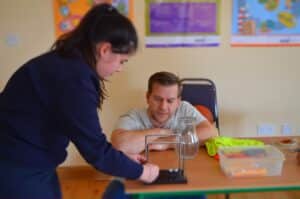
The senior primary workshop is aimed at pupils from 3rd to 6th class but can also be suitable for 2nd class. It is approximately one hour and we can run up to three workshops during the school day. In advance of the workshop, the school will be sent a selection of posters to promote saving energy. The workshop is in three parts: a class discussion on energy after watching a short video, experiments and Guzzler’s Energy Challenge Game.
The workshop covers several strands of the science curriculum such as energy and forces and environmental awareness and care.
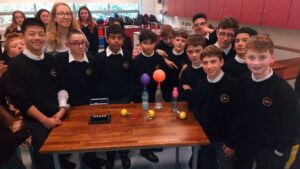
Workshops are available for Junior Cycle students and are relevant to a range of subjects: Science, Home Economics, Geography, CSPE and Business where the topic of sustainable energy features. Workshops are approximately one hour and 20 minutes and are designed to fit into a double class period. We can run up to two workshops during the school day.
All workshops aim to actively involve students in the learning process and students are encouraged to think critically about climate change, the ways we generate and use energy and the environmental impacts of our energy use.
The workshop covers several strands of the science curriculum such as energy and forces and environmental awareness and care.
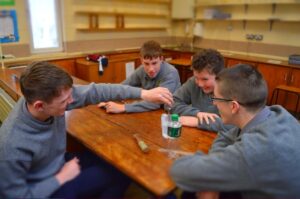
The TY workshop engages students on the topic of climate change and sustainability. It addresses the causes and global impacts of climate change and renewable and non-renewable technologies. The workshop is approximately 1 hour 20 minutes in duration and is designed to fit into a double class period. The workshop is mainly discussion based using video clips, maps, pictures, games and activities to help students evaluate how our everyday activities and actions such as the burning of fossil fuels for heat and electricity in our homes can have a global environmental impact. It introduces the concept of sustainable development and encourages the students to think critically about global issues and their solutions.
The workshop is aimed at Transition Year students but can be adapted for younger students. It is not specifically a science workshop but covers aspects of many different curriculum areas such as Junior Cert Science, Environmental and Social Studies (ESS), Civic, Social and Political Education (CSPE) and aspects of Junior Cert and Leaving Cert Geography
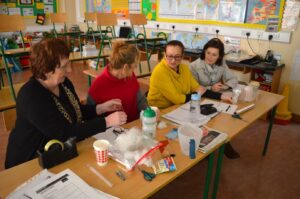
Book now for a free Teacher* workshop at Mount Lucas Wind Farm, Co Offaly – run by experts in sustainable energy education, and:
When & Where
📅 21st March 2026 – 10am to 2pm including tea/coffee & light lunch
📍 Mount Lucas Wind Farm & Nearly Zero-Energy Training Centre
Book here www.issn.ie/new-page-2
*open to all primary & post primary teachers – spaces limited so don’t miss out
In these webinars Una from SEAI will show us how sustainable energy can ignite curiosity in your students, encouraging them to learn and save energy – at school, at home and in their community.
January 27th
19.00-20.00hrs
Sustainable Energy is Awesome – Teaching & Saving Energy in Primary Schools
Whether you’re interested in finding out about energy in the new curriculum, or what’s involved in an SEAI pupil workshop (tailored for junior and senior
primary) or keen to start action projects in your school, this webinar is for you.
24th February
19.00-20.00hrs
Exploring Sustainable Energy – Teaching & Saving Energy in Post-Primary Schools
Whether you’re interested in finding out about energy across the various Junior Cycle & TY specifications, what’s involved in
an SEAI student workshop or keen to start action projects in your school, this webinar is for you.
Register here
